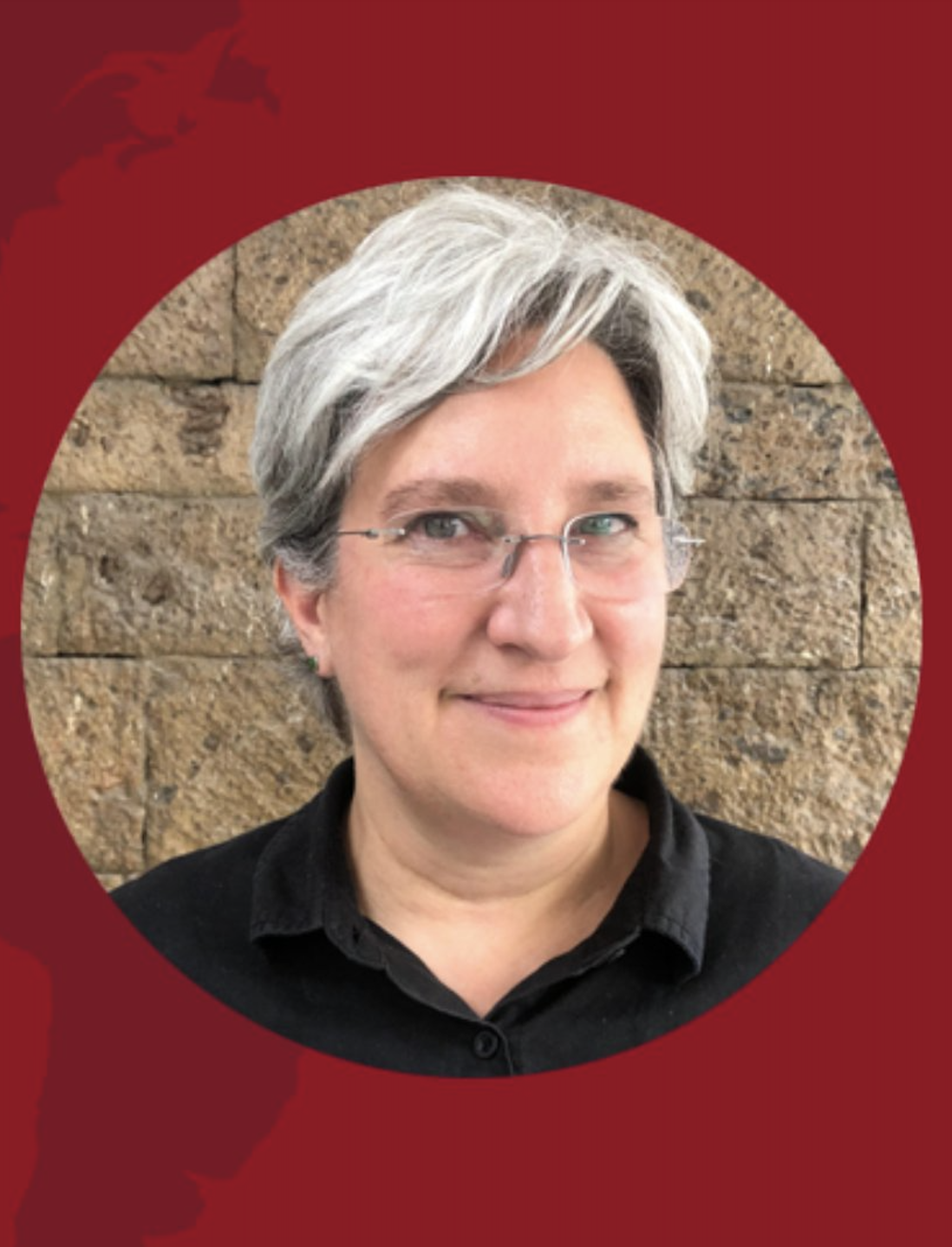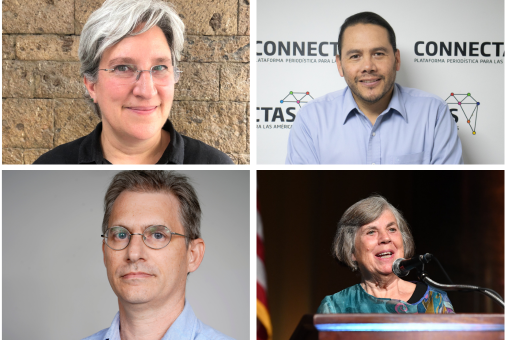Global press freedom organizations agree that Mexico is the country with one of the highest number of murdered and disappeared journalists, with impunity levels of almost 100 percent. But the danger of losing their lives is not the only obstacle that Mexican journalists face when practicing their profession.
Ongoing smear campaigns, loss of public trust and digital violence are among other major challenges that journalists have to face in Mexico today, said Mexican journalist Alejandra Xanic, managing editor and co-founder of the non-profit innovation and investigative journalism organization Quinto Elemento Lab.
Xanic was announced last July as a gold medal winner of the 2023 Maria Moors Cabot Prize, the world's oldest international journalism award, created in 1938 by Columbia University in New York City to recognize distinguished careers in journalism.

Alejandra Xanic won the Pulitzer Prize, the Mexican National Journalism Award, and this year, the Maria Moors Cabot Award. (Photo: Columbia University)
Xanic's more than 30-year career has been focused on investigative journalism. During those years, she has taken on all kinds of powerful figures. In 2012 she took on Walmart, one of the world's most powerful corporations, with an investigative story she did with U.S. journalist David Barstow for The New York Times. The article revealed a bribery scheme through which the transnational company opened multiple stores in Mexico between 2003 and 2005. This work earned them nothing less than the Pulitzer Prize for Investigative Journalism.
For Xanic, the new generations of journalists face much greater challenges than those she has encountered in her career. This is due, in part, she said, to the political polarization that currently exists in Mexico and the constant verbal attacks by political figures, including President Andrés Manuel López Obrador.
"I believe we journalists in Mexico face a daily smear campaign that is affecting the way people receive us at home," Xanic told LatAm Journalism Review (LJR). "People already have an opinion of us that maybe they didn't have before, because they follow a politician or because they listen to the president. But I also believe we’re in a moment where the conversations are very difficult when it comes to politics in Mexico, and very antagonistic. So if anyone says anything that appears to criticize something, you receive a cascade of attacks."
Social media violence against members of the press should be considered as much of a threat as physical violence, Xanic said, as the former can translate into the latter. Therefore, another important challenge for Mexican journalists is how to handle such digital violence.
"We are [currently] being targeted more, especially women journalists. During the toughest reporting I did in the past, I didn't have to deal with that, and it does have an emotional cost, I think, a very high one," she said. “I don't know if we know how to deal with it, individually and in [media] organizations.”
In the face of violence and smear campaigns, there are measures that journalists can put into practice to continue doing their work without risking their physical integrity, Xanic said. One tactic is not letting fear decide which topics to cover and which ones not to cover, but rather making a risk analysis and taking actions to lessen them.
"It's not worth putting your life [in danger], but I think that before self-censoring ourselves, we should look at a 'yes, but how?'. First, [we should ask ourselves] 'is it worth it?,' 'why is it so worth it?,' 'what might change if this is disclosed?,' 'how can it be done?,' and whether that risk reduction is enough for you to say 'sure, let's go ahead with that story,'" she said.
Xanic said one measure proven effective to protect against attacks and smear campaigns is to join efforts with journalists or media organizations through collaborative work, either locally or across borders. Under this principle, Quinto Elemento Lab has collaborated with media outlets in Mexico and other countries, producing stories such as "The Mayan Riviera gang," carried out alongside Organized Crime and Corruption Reporting Project (OCCRP), Mexicanos Contra la Corrupción y la Impunidad (MCCI, by its Spanish acronym) [Mexicans against corruption and impunity] and the RISE Project. This work received a 2020 EPPY Award in the category of best collaborative investigative reporting.
"The issue is how not to hinder the journalistic impulse. In other words, not to let fear sneak in through the door and settle in our hearts and in our eyes, and keep us from doing [journalism]," she said. "In some cases, I believe it will, but perhaps not out of fear, but rather common sense and care will convince us to set a topic aside and say 'not right now.'"
Despite the fact that in Mexico there is a lot of good investigative journalism on corruption, politics and human rights issues, it rarely has visible real-life consequences. Or at least consequences many would like, such as having officials resign or a change in laws, Xanic said. However, for Xanic this does not mean that investigative journalism in Mexico does not have a significant impact.
Xanic said that historically, Mexican investigative journalists have had other motivations that go beyond those in other regions, such as in Anglo-Saxon countries, where the idea is that journalism is done to make change happen.
"Since I started reporting, I grew alongside that [idea]. I learned to do journalism thinking that nothing was going to happen, that the only thing that could happen is that I’d inform other citizens of what is happening, not because by publishing it something was going to happen," she said. "There are very few investigations — I think of 'La Estafa Maestra [The master scam],' or 'La Casa Blanca [The white house of Enrique Peña Nieto]' — that have provoked changes."

Xanic currently spends most of her day coordinating the MasterLAB, the pioneer program in training editors to lead investigative reporting. (Photo: Screenshot from Quinto Elemento Lab's YouTube)
What is happening, she said, is that there are increasingly more civil organizations in Mexico that use the revelations in investigative journalism stories to advance their causes and bring them to public discussion, which serves as a loudspeaker to amplify the reach of journalistic findings.
Some of the biggest revelations of corruption cases in recent years have stemmed from investigative work in which news outlets collaborated with civil society organizations. Xanic gave the example of Animal Político, which together with MCCI carried out the report "La Estafa Maestra [The master scam]," which unveiled a system of shell companies through which the government of former President Peña Nieto allegedly diverted more than 400 million dollars.
Although the investigation led to the opening of proceedings against at least 12 former officials, the case remains unpunished and it has not been possible to clarify the route of the diverted money.
"I believe [journalism’s impact] is happening one way or another. Maybe it's a longer route, but I feel that thanks to the diversity of actors and the communication that is happening among journalists and people from civil associations, our stories are seeping through other pores," she said.
In 2022, Xanic stepped down as director of Quinto Elemento Lab, an organization she co-founded in 2017 with fellow Mexican journalist Marcela Turati. Armando Talamantes took her place and Xanic now serves as the organization's managing editor. This move was meant to refresh the organization and bring new ideas to the board.
Xanic currently spends most of her day editing Quinto Elemento Lab's investigations and coordinating, together with U.S. journalist Kathy Corcoran, the MasterLAB, a pioneer Spanish-speaking program for training editors in investigative reporting.
The program is currently in its third edition, which began in May and will end at the end of September. Over three generations, MasterLAB has trained 63 editors and has created a network of nearly 40 mentors from Latin America, the United States and Europe.
Although the main objective of the program is to develop skills to lead investigative reporting, its coordinators seek to turn it into a network of exchange among peers who can support each other on labor and security issues.
"Being an editor is not something you are taught by anyone in a news outlet," Xanic said. "In general, there’s no tradition of training editors in the region. I'm also surprised to tell you there isn't one in the U.S. either. From what we hear, ProPublica just launched a training program for investigative editors this year. CONNECTAS has one for media management, but there is not a lot of this in general either."
Xanic said that among the issues that most concern editors who have gone through the MasterLAB program are how to reconcile investigative journalism with daily coverage in a news outlet, how to ensure the safety of their teams and how to help reporters improve their writing, as well as how to achieve sustainability as a news outlet.
Experts believe editors will be more necessary once newsrooms adopt new generative artificial intelligence tools in their editorial processes. But, for Xanic, editors must go beyond curating digital content.
"I don't know very well what kind of editor the future will bring. What I do believe is that as a reader, I’d aspire to have something more than content curators, because I do feel that there’s a lack of criteria in the way in which information is being built in the media," she said. "Now, at least in Mexico, a web editor is someone with less expertise rather than more."
Unlike when she won the Pulitzer, in 2013, which for Xanic meant the opening of new conversations, collaborations and contact with important journalism figures around the world, being chosen as one of the Gold Medalists of the 2023 Cabot Prize touched her more personally, because she associates that prize with much-admired figures from whom she has learned throughout her career.
Xanic will receive the Cabot prize on Oct. 18 at Columbia University's Low Library, along with the other honorees: June Carolyn Erlick, of ReVista-Harvard Review of Latin America (United States); Joshua Goodman, of the Associated Press (United States); and Carlos Eduardo Huertas, of Connectas (Colombia).

In addition to Alejandra Xanic (above, left), this year's honorees are Carlos Eduardo Huertas (above, right), Joshua Goodman (below, left) and June Carolyn Erlick (below, right). (Photo: Columbia University)
In addition, independent journalist Miguel Mendoza (Nicaragua), and Nayeli Roldán, of Animal Político (Mexico), will receive a 2023 Special Mention.
"On a personal level, it touched me deeply, it shook me. On the one hand, I felt like this prize had come from another place, like a hug from colleagues. I felt it as an affectionate embrace from colleagues along the way. In that sense, it was like a very emotional jolt, very exciting," Xanic said.
Although the Cabot Prize recognizes the excellence of her career, Xanic confessed that she sees her more-than-three-decades career in journalism as a journey of ups and downs, rather than as a path of excellence.
Although her career took off because of investigative journalism, Xanic said that, if she could, she would advise her younger self to become more professional in daily reporting, learn more skills as a reporter and develop a method of organization much earlier on.
"I did work in daily news, but I think it would have been important to do more daily news before going into investigation. I would tell her to 'do more to develop sources.' Since I was bouncing between topics, maybe I lacked more time and intention to develop sources. I’d also tell her 'learn shorthand, keep better notes, and create a method to store, preserve, and organize [information]'. If I’d done it earlier, I’d have been happier."